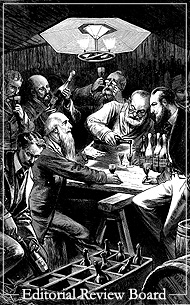
|
 |

A Publication of M2 Communications
jack-daw [JAK-dah], n. 1. a glossy, black, European bird, corvus monedula, of the crow family, that nests in towers, ruins, etc.; has a proclivity to collect bright objects that attract its attention; can include bits of ice, things round or square, twigs, filaments of light bulbs; specialist on the lookout of what fits the construction of its nest.
jackdaw journal [JAK-dah JERN-al], n. 1. a repository of bright objects — wit, wisdom and whimsey — collected and/or created by Michael McKinney. 2. a web log or blog

|  |  |
 |
 |
 |
|
 |
Communication Archives
* * * |
| |

W. Somerset Maugham on mistaking obscurity for profundity
June 10, 2023
|
 |
 “I HAVE NEVER had much patience with the writers who claim from the reader an effort to understand their meaning. You have only to go to the great philosophers to see that it is possible to express with lucidity the most subtle reflections. You may find it difficult to understand the thought of Hume, and if you have no philosophical training its implications will doubtless escape you; but no one with any education at all can fail to understand exactly what the meaning of each sentence is.
There are two sorts of obscurity that you find in writers. One is due to negligence and the other to willfulness. People often write obscurely because they have never taken the trouble to learn to write clearly.
“Another cause of obscurity is that the writer is himself not quite sure of his meaning. He has a vague impression of what he wants to say, but has not, either from lack of mental power or from laziness, exactly formulated it in his mind and it is natural enough that he should not find a precise expression for a confused idea. This is due largely to the fact that many writers think, not before, but as they write. The pen originates the thought. The disadvantage of this, and indeed it is a danger against which the author must be always on his guard, is that there is a sort of magic in the written word. The idea acquires substance by taking on a visible nature, and then stands in the way of its own clarification. But this sort of obscurity merges very easily into the willful. Some writers who do not think clearly are inclined to suppose that their thoughts have a significance greater than at first sight appears. It is flattering to believe that they are too profound to be expressed so clearly that all who run may read, and very naturally it does not occur to such writers that the fault is with their own minds which have not the faculty of precise reflection. Here again the magic of the written word obtains. It is very easy to persuade oneself that a phrase that one does not quite understand may mean a great deal more than one realizes. From this there is only a little way to go to fall into the habit of setting down one’s impressions in all their original vagueness. Fools can always be found to discover a hidden sense in them.”
From The Summing Up
* * *
|

Think Empathy Before You Get on Your Soapbox
January 23, 2009
|
 |
 Eliot Cohen, who serves as a counselor to government – most recently the Department of State – writes that empathy, as opposed to sympathy, is an essential quality for a successful pundit. He advises:
Do not prescribe a policy that the current group of officials cannot hope to implement because of who they are. I have had highly intelligent individuals -- including some with senior government experience -- sit in my office and lay out perfectly plausible policies that the current team, limited by time remaining in office, the pressure of competing and more urgent crises, and the all important mix of personalities, could never hope to put into effect.
Moreover, core beliefs and style constrain policy makers profoundly. So don't ask them to do something outside their range of psychological possibility by, for example, proposing cold-eyed realpolitik to a band of idealists or vice versa. There are no platonic ideal-type policies, valid no matter who is in charge. What may make sense for one administration may make no sense for another, not because of the external environment, but because of who has to execute the policy and live with its consequences.
High-quality commentary reaches audiences (including those overseas) who may not affect daily policy making, but whose opinions matter in subtler and longer-term ways. Well done, it sharpens a larger discourse -- and besides, it's more therapeutic than shouting at your television set. A prudent commentator should be modest in his aspirations, conscious of his limitations, and sparing with his exhortations.
* * *
|

Joe McNally on Creativity
February 27, 2008
|
 |
 Joe McNally is a photographer and photojournalist. In discussing his new book he made this comment that gets to the heart of creativity and good communication. “Getting your camera in a different place is very crucial because the world is much seen. So if you can just put a twist on some already expressed situation you’re gaining ground photographically.”
McNally has a blog and talks about his new book, The Moment It Clicks , here.
* * *
|

Listen Before You Speak
September 12, 2007
|
 |
 Roger Horchow Roger Horchow in the book he wrote with his daughter Sally, The Art of Friendship relates the following great story to illustrate the point that active listening opens up a world of potential relationships—and you might learn something.
My friend Dick Bass (now in his 70s) has traveled far and wide and had many adventures. His achievements include being the first person to climb the highest peak on each of the seven continents, as well as being the oldest person (by five years) to climb Mount Everest (at the age of 55.)
He once told me a story of a plane ride, on which he sat next to a nice man who listened to him go on about the treacherous peaks of Everest and McKinley, the time he almost died in the Himalayas, and his upcoming plan to reclimb Everest. Just before the plane landed, Bass turned to the man sitting next to him and said, “After all this, I don’t think I’ve introduced myself. My name is Dick Bass.” The man shook his hand, and responded, “Hi, I’m Neil Armstrong. Nice to meet you.”
* * *
|

Effective Communication
May 10, 2007
|
 |
 The New York Times The New York Times last week quotes Rupert Murdoch on the Wall Street Journal, “I’m sometimes frustrated by the long stories,” adding that he rarely gets around to finishing some articles. Seth Godin put it best, “How to write for a millionaire.” When it comes to effectiveness, length and content go hand-in-hand. I hear far too many speeches where people are just filling time. They often lose me.
|
|
 |

|
|